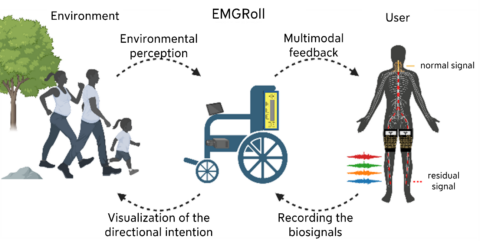N-Squared Lab: Empowering Independent Wheelchair Use with EMGRoll

Mobility impairments have far-reaching consequences for the everyday lives of those affected and often lead to psychological problems as well as physical limitations. The wheelchair is the only way for those affected to participate in daily life. However, due to functional limitations of the upper extremities, for example as a result of tetraplegia, not all people with disabilities are able to use a conventional wheelchair. The operation of an electrically powered wheelchair is also affected. In addition to physical limitations, insufficient motor or cognitive skills can also be an obstacle to the independent use of a wheelchair and thus restrict participation in daily life.
The aim of EMGRoll is to research a sensor kit that enables intuitive and assisted control of electrically powered wheelchairs by combining EMG signals and sensors for environmental detection. Based on the realisation that most tetraplegic patients still have a neuronal connection between their brain and muscles, the n-squared lab, headed by Prof. Dr Alessandro Del Vecchio, has developed a brain-machine interface. In EMGRoll, this is to be extended to the lower extremities in order to measure the movement intention of the legs and pass it on to the wheelchair control system. In order to intelligently adapt the movement intention to the environment, the autonomous navigation for wheelchairs developed by the Chair of Factory Automation and Production Systems (FAPS) under the direction of Prof. Dr Jörg Franke will be used to explore shared control of the wheelchair between the user and the intelligent machine.
The functional demonstrator of the sensor kit developed in EMGRoll will serve as the basis for a start-up company subsequently funded by EXiST.
Dr. Sina Martin is in charge of the EMGRoll project, which is being funded with around 984.986,48 €. Prof. Dr. Alessandro Del Vecchio is leading the project on behalf of the n-squared lab.